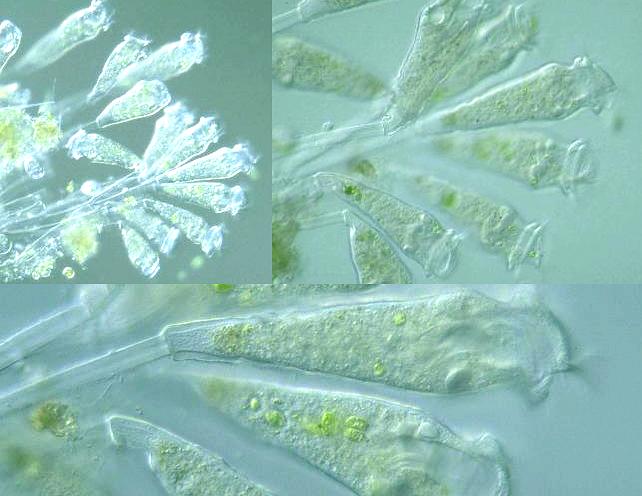 Genus: Colonial; without lorica; less than 3 turns of oral cilia; swarmer with median scopula
(Illustrated Guide, 1985).
Stalk not contractile; body contractile.
Genus: Colonial; without lorica; less than 3 turns of oral cilia; swarmer with median scopula
(Illustrated Guide, 1985).
Stalk not contractile; body contractile.
Species:
 Genus: Colonial; without lorica; less than 3 turns of oral cilia; swarmer with median scopula
(Illustrated Guide, 1985).
Stalk not contractile; body contractile.
Genus: Colonial; without lorica; less than 3 turns of oral cilia; swarmer with median scopula
(Illustrated Guide, 1985).
Stalk not contractile; body contractile.
Species: |
















Epistylis hentscheli Kahl, 1935: Cell body trumpet-shaped, slightly curved; 108-234 μm long, 36-79 μm wide; peristome 50-94 μm wide; peristomal disc extends forward with slope; pellicle striated; macronucleus horseshoe-shaped (Kojima, et al., 1995).
Epistylis chrysemidis:
230-250 μm long; extra collar around
peristome when expanded; cytopharynx large, deep; stalk branches dichotomously lacking
myonemes; fresh water (How to know the protozoa, 1979).
Epistylis cambari:
Peristome 50 μm; common on gills of
crayfish (How to know the protozoa, 1979).
Epistylis niagarae:
Up to 180 μm long; on western painted turtle
(How to know the protozoa, 1979).
Epistylis urceolata:
160 μm long; common on larvae of
Chironomus (How to know the protozoa, 1979).